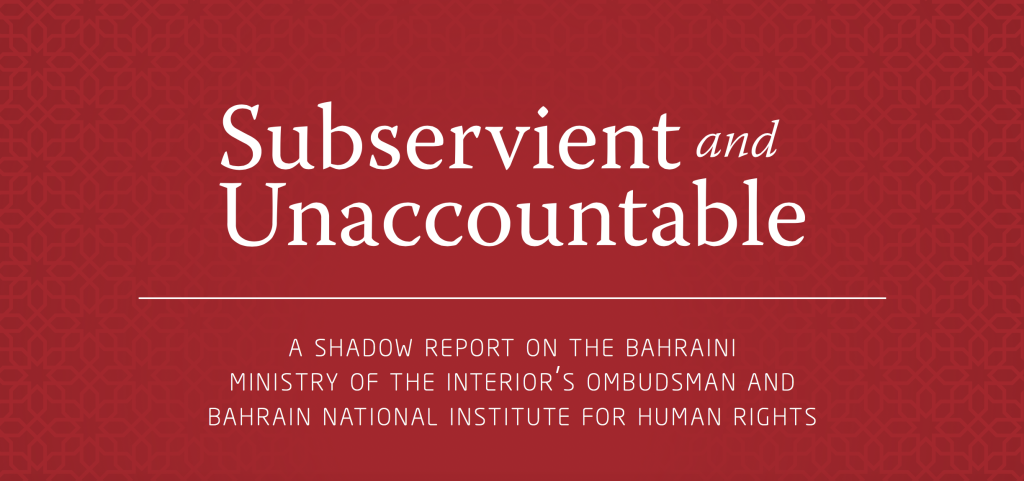Read the report: Subservient and Unaccountable: A Shadow Report on the Bahraini Ministry of Interior’s Ombudsman and Bahrain National Institute for Human Rights
During the 27th session of the Human Rights Council, the Government of Bahrain submitted its interim report on the status of recommendations made in the course of its second UPR cycle. The government claims to have made progress in regards to many of the recommendations, including: improving laws against torture, releasing political prisoners, improving women’s status in society, and reforming the judicial system. In reality, the improvements cited by the government are largely superficial and fail to address the essence of the recommendations made during the second UPR cycle.
The Government of Bahrain claims to have implemented reforms to address recommendations 115.22, 115.42, 115.84, 115.85, 115.86, 115.87, 115.92, 115.106, 115.108, 115.111, 115.112, 115.113, and 115.121 concerning the criminalization of torture and compensation for victims of torture. In its report, the government says that it has changed its legal definition of torture to conform to the Convention against Torture and Other Cruel, Inhuman or Degrading Treatment or Punishment. The government cites its creation of the Special Investigations Unit (SIU) and of the Office of Inspector General and the Office of Professional Standards inside of the National Security Agency (NSA) as means of prosecuting torture. However, the SIU is situated within the structure of the Ministry of the Interior and therefore lacks the impartiality and independence needed to effectively prosecute torturers. Additionally, NSA investigations into torture have created few prosecutions, most of which have only concerned low-ranking officials. Additionally, a recent report from the Bahrain National Institution for Human Rights shows that widespread and systemic reports of torture continue to emanate from Bahraini prisons.[i] Thus, the Government of Bahrain fosters a culture of impunity, wherein torture continues and victims do not receive adequate redress.
The Government of Bahrain continues to assert that it has followed recommendations 115.98, 115.114, 115.116, 115.117, 115.118, and 115.125 concerning the review of convictions against peaceful protesters. The government claims to no longer hold prisoners on account of their exercise of political expression. However, substantial numbers of political prisoners, including Abdulhadi al-Khawaja, Ebrahim Shareef, and others who were arrested during the February 2011 protest, continue to be held in prison on criminal charges. Additionally, the government recently imprisoned and then released noted human rights defender Maryam al-Khawaja in September 2014.
The Government of Bahrain has additionally restricted the rights of free speech, association, and assembly. During a special session of Bahrain’s parliament, the government passed security recommendations to ban “demonstrations, marches, rallies, and sit-ins” at night, within the capital, or near places like malls, airports, and hospitals.[ii] Coupled with Bahrain’s use of its anti-terrorism laws to persecute human rights defenders, this law has created an environment in which peaceful protesters continue to be punished for exercising fundamental human rights.
Following the BICI Report, the Government of Bahrain enacted legal reforms mandating that civilian courts review cases previously tried under the National Security Court system. While the international community welcomed this move, the trials held in the civilian courts continued to deviate from internationally accepted fair trial standards. Evidence obtained through the use of torture and other abuse continues to be accepted and international standards for transparency remain to be met.[iii]
The government continues to fall short of enacting reforms that fully meet recommendations 115.38, 115.39, 115.48, 115.49, 115.50, 115.51, 115.68, 115.69, 115.71, 115.72, 115.73, 115.74 115.77, and 115.139 concerning women’s rights, gender equality, and family law. The King has approved a National Plan for the Advancement of Bahraini Women, the goal of which is to seek “economic empowerment; political empowerment; integration of women’s needs (equal opportunity); and family stability.”[iv] The government continues to consider withdrawing reservations to the Convention on the Elimination of all Forms of Discrimination against Women (CEDAW), namely in regards to Articles 2, 9(2), 15(4), and 16, but says that reservations will remain in place “until the necessary legislative and constitutional measures are completed.”[v] Additionally, while the government has sent a draft law to the legislature allowing Bahraini women to pass their citizenship onto their children, this law has stalled in Parliament, and no action has been taken on the law in the last six months.[vi]
After the second UPR cycle, the Government of Bahrain fully accepted recommendations 115.40, 115.55, 115.129, and 115.131 concerning the establishment of a National Dialogue. Last week, Bahrain’s Crown Prince Salman bin Hamad al-Khalifa announced that the National Dialogue had come to an agreement concerning parliamentary and judicial reforms and redistricting. However, the government reached this breakthrough without receiving input from Bahrain’s largest opposition group, al-Wefaq, who left the process in 2013 after the government arrested Khalil al-Marzooq under the pretext of Bahrain’s terrorism law for participating in a protest.[vii] Al-Wefaq concluded that the government would not heed their concerns, and the government chose to continue the Dialogue without their participation. As a result, serious issues persist over the government’s continued failure to include opposition figures in the National Dialogue in a manner in which their voices and opinions are heard and respected.
Footnotes:
[i] “Subservient and Unaccountable: A Shadow Report on the Bahraini Ministry of the Interior’s Ombudsman and Bahrain National Institute for Human Rights,” Bahrain Institute for Rights and Democracy and Americans for Democracy and Human Rights in Bahrain. July 2014.
[ii] “Issuance of decrees by HM the king,” Bahrain News Agency. 6 August 2013. Web accessed 26 September 2014. http://www.bna.bh/portal/mobile/news/574372; “Bahrain’s Move to Legalise Repression,” Bahrain Watch. 7 August 2013. Web accessed 26 September 2014. https://bahrainwatch.org/blog/2013/08/07/bahrains-move-to-legalise-repression/
[iii] “Subservient and Unaccountable: A Shadow Report on the Bahraini Ministry of the Interior’s Ombudsman and Bahrain National Institute for Human Rights,” Americans for Democracy and Human Rights in Bahrain. July 2014.
[iv] “Kingdom of Bahrain: Universal Periodic Review Interim Report.” Government of Bahrain. September 2013. 36-37.
[v] Ibid. 4-5.
[vi] Ibid. 5.
[vii] “A Follow-Up Report on Bahrain’s UPR Second Cycle,” Americans for Democracy and Human Rights in Bahrain. January 2014. 50.




